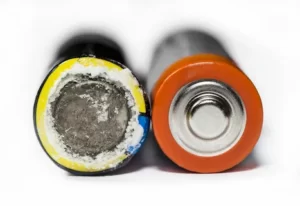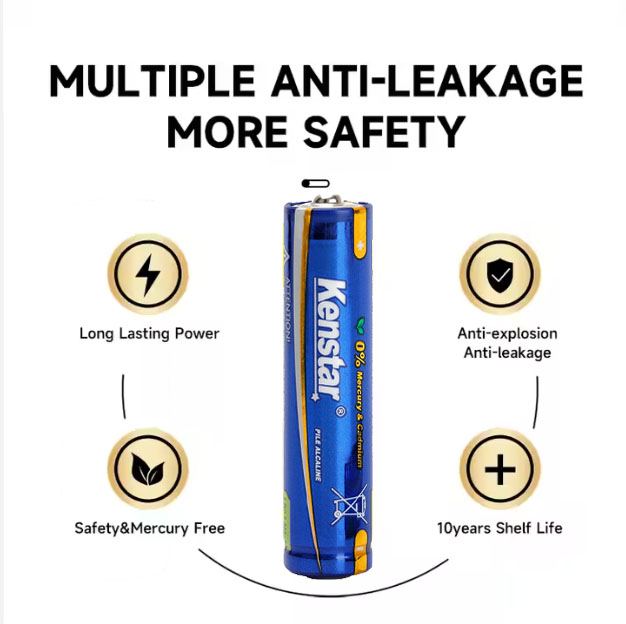
Causes of Alkaline Battery Leakage
Expired Alkaline Batteries
Expired alkaline batteries pose a significant risk for leakage. As these batteries age, their internal chemistry changes, leading to the generation of hydrogen gas. This gas builds up pressure inside the battery, which can eventually rupture the seals or the outer casing. Users often report that the likelihood of leakage increases significantly about two years before the expiration date. This correlation suggests that monitoring expiration dates is crucial for battery safety.
Key Point: Always check the expiration date on alkaline batteries and replace them before they expire to minimize leakage risks.
Extreme Temperatures and Alkaline Batteries
Temperature plays a critical role in the integrity of alkaline batteries. High temperatures can accelerate chemical reactions within the battery, causing the internal pressure to rise. This pressure can lead to leakage or even rupture. For instance, heat causes the potassium hydroxide paste inside the battery to expand, forcing chemicals out of the seals. Ideally, alkaline batteries should be stored at temperatures between 15 to 25 degrees Celsius (59 to 77 degrees Fahrenheit) to maintain their performance and prevent leakage.
- Safe Storage Temperatures:
- 15 to 25 degrees Celsius (59 to 77 degrees Fahrenheit)
- Relative humidity around 50 percent
Key Point: Store alkaline batteries in a cool, dry place to prevent leakage caused by extreme temperatures.
Overcharging and Short-Circuiting Alkaline Batteries
Overcharging and short-circuiting are two common issues that can lead to leakage in alkaline batteries. Overcharging creates excessive internal pressure, which can force the battery casing to rupture. Similarly, short-circuiting can damage the battery’s protective casing, resulting in electrolyte leakage. Leaving batteries unused for extended periods can also build gas pressure, increasing the risk of leakage. Physical abuse, such as applying unnecessary force, can further compromise the battery’s integrity.
- Risks of Overcharging and Short-Circuiting:
- Excessive internal pressure
- Damage to the battery casing
- Gas buildup from prolonged inactivity
Key Point: Avoid overcharging and ensure proper handling of alkaline batteries to reduce the risk of leakage.
Manufacturing Defects in Alkaline Batteries
Manufacturing defects can also contribute to leakage in alkaline batteries. Quality control measures are essential in the production process to minimize these risks. Advanced technology and strict adherence to industry standards help ensure that batteries are less prone to leakage. However, even with rigorous quality checks, some defects may slip through, leading to compromised battery integrity.
| Quality Control Measure | Description |
|---|---|
| Use of Advanced Technology | Adoption of international advanced production and R&D technology to enhance battery performance. |
| Quality Certifications | Compliance with industry standards and certifications (e.g., QMS, CE, UL) to ensure product quality. |
| Battery Management System (BMS) | Real-time monitoring of battery conditions to prevent overcharging, over-discharging, and leakage. |
Key Point: Choose high-quality alkaline batteries from reputable manufacturers to minimize the risk of leakage due to manufacturing defects.
Key Takeaways
- Always check the expiration date on alkaline batteries. Replace them before they expire to minimize leakage risks.
- Store alkaline batteries in a cool, dry place. Ideal temperatures are between 15 to 25 degrees Celsius (59 to 77 degrees Fahrenheit) to prevent leakage.
- Use high-quality alkaline batteries from reputable brands. This can significantly reduce the risk of leakage and protect your devices.
How to Prevent Alkaline Battery Leakage

Use High-Quality Alkaline Batteries
I always prioritize using high-quality alkaline batteries to minimize the risk of leakage. Brands like Energizer, Rayovac, and Eveready stand out for their advanced leak-resistant designs. These reputable brands utilize superior materials that effectively contain internal chemicals, significantly reducing leakage risks compared to generic alternatives. The leak-resistant construction of these batteries protects devices from potential damage, even during prolonged use.
Key Point: Investing in high-quality alkaline batteries can save you from the hassle and dangers associated with leakage.
Store Alkaline Batteries Properly
Proper storage of alkaline batteries is crucial for preventing leakage. I recommend keeping them in a cool, dry place, ideally at room temperature. Here are some essential storage tips:
- Store batteries in their original packaging until use.
- Avoid placing them near metal objects to prevent accidental discharging.
- Ensure the storage area is free from extreme temperatures and humidity.
By following these guidelines, I can prolong the shelf life of my alkaline batteries and reduce the chances of leakage.
Key Point: Proper storage conditions can significantly extend the life of alkaline batteries and prevent leakage.
Avoid Mixing Old and New Alkaline Batteries
Mixing old and new alkaline batteries in the same device can lead to uneven power distribution and increase the risk of leakage. I have learned that different discharge rates can shorten the overall lifecycle of the batteries. Here are some risks associated with this practice:
- The new battery does most of the work, leading to faster depletion.
- The old battery can overheat, posing a safety risk.
- Inconsistent power supply can damage the device.
| Risk | Explanation |
|---|---|
| Increased Internal Resistance | Older batteries have higher resistance, leading to overheating. |
| Overheating | The new battery does most of the work, causing the old battery to heat up due to high resistance. |
| Reduced Battery Life | The new battery wears out faster as it compensates for the old battery’s lack of power. |
Key Point: Always use batteries of the same age, size, power, and brand to ensure optimal performance and safety.
Regularly Check Alkaline Battery Condition
Regular checks on alkaline batteries can help catch potential issues before they escalate. For frequently used devices, I usually notice when the device stops functioning, prompting me to replace the batteries. However, for devices that I rarely use, I recommend checking or replacing batteries annually. Here are some visual indicators that suggest an alkaline battery may be at risk of leaking:
| Indicator | Description |
|---|---|
| Crusty deposits | Crystalline deposits on battery terminals caused by corrosive materials. |
| Bulging battery case | Indicates overheating, which can lead to leakage. |
| Unusual smells | An acrid smell can hint at a hidden battery leak. |
Key Point: Regularly inspecting alkaline batteries can help prevent leakage and ensure device safety.
What to Do If Alkaline Battery Leakage Occurs

Safety Precautions for Alkaline Battery Leakage
When I discover alkaline battery leakage, I take immediate action to ensure my safety. First, I always wear gloves to protect my skin from the corrosive battery acid. I handle the leaking battery carefully to avoid further leakage or rupture. Here are the steps I follow:
- Wear gloves to protect your skin from battery acid.
- Carefully remove the leaking battery from the device without forcing it.
- Place the battery in a non-metallic container to prevent further damage.
- Neutralize the leaked chemical by covering it with baking soda or pet litter.
- Dispose of the battery and cleaning materials according to local regulations.
Key Point: Taking safety precautions is essential when dealing with alkaline battery leakage to prevent skin irritation and chemical burns.
Cleaning Corroded Alkaline Battery Compartments
Cleaning corroded battery compartments requires careful attention. I use effective cleaning agents like white vinegar or lemon juice to neutralize the corrosion. Before I start, I ensure I wear protective gear, including gloves and safety goggles. Here are some precautions I take:
| Precaution | Description |
|---|---|
| Wear protective gear | Always wear gloves and safety goggles to protect against splashes and corrosive materials. |
| Work in a well-ventilated area | Ensure good airflow to avoid inhaling noxious fumes from cleaning agents. |
| Disconnect the battery | Prevent electric shock and accidental short circuits by disconnecting the battery before cleaning. |
Key Point: Proper cleaning techniques can restore the functionality of devices affected by alkaline battery leakage.
Proper Disposal of Leaked Alkaline Batteries
Disposing of leaked alkaline batteries responsibly is crucial for environmental safety. I recognize that improper disposal can lead to serious hazards. I follow these recommended methods for disposal:
- Recycling centers for batteries are available in most towns and cities, specializing in safe disposal.
- Local retailers may have collection boxes for used batteries, ensuring responsible disposal.
- Communities often hold special collection events for hazardous waste, including batteries.
Key Point: Responsible disposal of alkaline batteries minimizes environmental impact and protects local ecosystems.
Understanding the causes of alkaline battery leakage empowers me to take preventive measures. Increased awareness leads to informed choices, such as using high-quality batteries and proper storage. By prioritizing these practices, I can significantly reduce leakage incidents and prolong battery life.
Key Point: Awareness and proactive measures are essential for maintaining battery safety and longevity.
FAQ
What should I do if my alkaline batteries start leaking?
If I notice leakage, I wear gloves, remove the battery carefully, and clean the area with baking soda to neutralize any corrosive materials.
How can I tell if my alkaline batteries are expired?
I check the expiration date on the packaging. If the date has passed, I replace the batteries to avoid leakage risks.
Can I use leaked alkaline batteries in my devices?
I avoid using leaked batteries. They can damage devices and pose safety hazards, so I dispose of them properly.
Key Point: Addressing battery leakage promptly and responsibly ensures safety and protects my devices from damage.
Post time: Sep-06-2025




